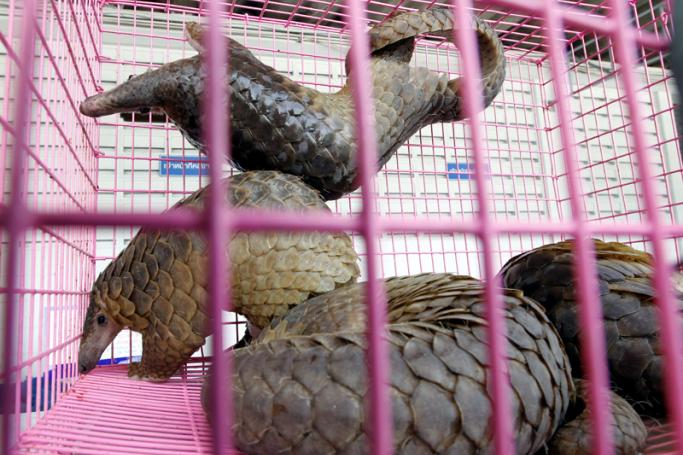Myanmar is an important source and transit hub for the trade of pangolin, one of the world’s most endangered species, according to a report released this week.
The illegal trade in live pangolins also includes their meat and their scales in market areas of Mong La, Myanmar, which borders on China, said a report by Traffic.org published in the Global Ecology and Conservation journal.
Pangolins are considered to be the most trafficked mammal in the world.
The study conducted surveys in Mong La’s morning market, trophy shops and wild meat restaurants during sporadic visits from 2006 to 2015.The authors found 32 whole skins, foetuses, pangolin parts and 27 whole pangolins openly for sale during the period. Similar markets take place in neighboring China and Thailand.
The origin of the pangolins in Mong La appeared to come from Myanmar, from neighbouring countries, and potentially Africa—“ivory, rhino horn and hippo teeth from Africa have all been observed in recent years in the market,” the report said.
Mong La is in Shan State on the border with China, where demand for pangolins and other exotic animals is high.
Pangolins have large, protective keratin scales covering their skin. They live in hollow trees or burrows, depending on the species, and are nocturnal. Their diet consists of mainly ants and termites which they capture using their long, specially adapted tongues.
They tend to be solitary animals, meeting only to mate and produce a litter. Pangolins are threatened by hunting (for their meat and armor) and heavy deforestation of their natural habitats.
International trade in pagolin is not allowed, according to the Convention on International Trade in Endangered Species of Wild Fauna and Flora.
“Ongoing demand and unopposed wildlife crime networks are pushing all four of Asia’s pangolins towards the brink of extinction” said Dr. Chris R. Shepherd, Regional Director of TRAFFIC in Southeast Asia.
“Collaboration between governments in Asia is needed to reduce cross-border trade significantly, to prevent these amazing species from being lost forever,” he said.
You are viewing the old site.
Please update your bookmark to https://eng.mizzima.com.
Mizzima Weekly Magazine Issue...
14 December 2023
Spring Revolution Daily News f...
13 December 2023
New UK Burma sanctions welcome...
13 December 2023
Spring Revolution Daily News f...
12 December 2023
Spring Revolution Daily News f...
11 December 2023
Spring Revolution Daily News f...
08 December 2023
Spring Revolution Daily News f...
07 December 2023
Diaspora journalists increasin...
07 December 2023
China praises outcome of Myanmar elections












